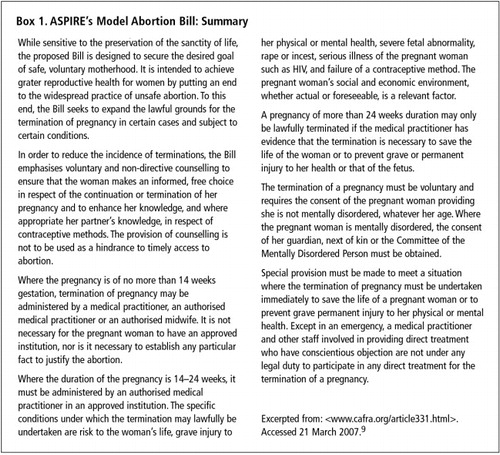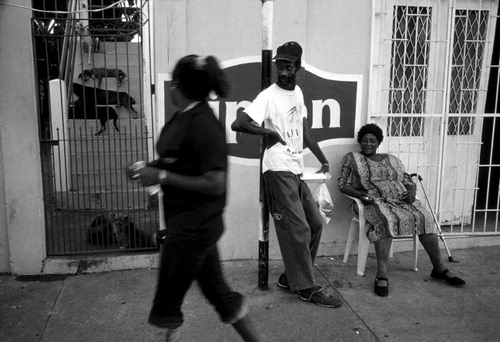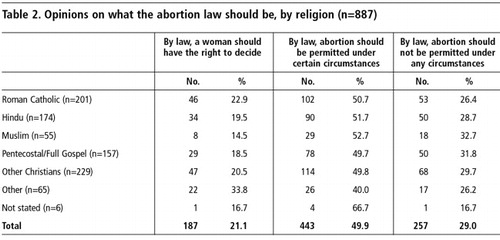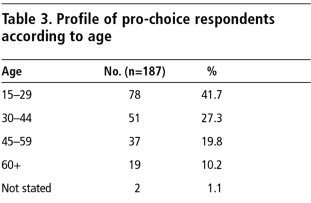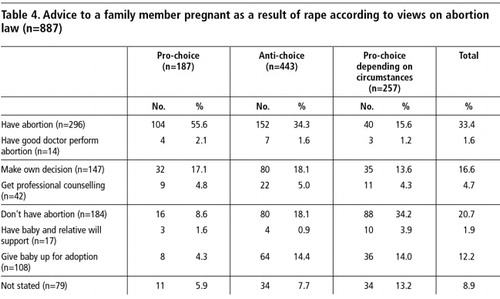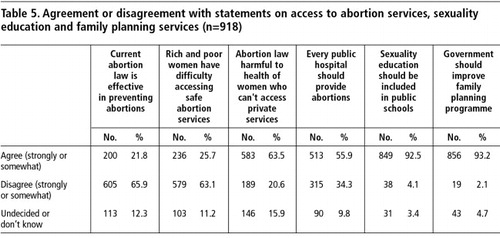Abstract
As for most of its Caribbean neighbours, Trinidad and Tobago's leading cause of maternal morbidity is unsafe abortion. Yet activism to introduce public policy and legislation that effectively address this aspect of women's reproductive rights and health has been met with public outcry. With almost hysterical opposition coming from certain religious quarters, there is the unsubstantiated impression that Trinidadians are overwhelmingly opposed to abortion law reform. A national survey was therefore carried out of people's knowledge and views on the current abortion law in Trinidad and Tobago. The survey found that although almost half of respondents had an unfavourable perception of abortion, more than half of them were in favour of broadening the legal grounds for accessing terminations. Incest, rape and danger to a woman's life were cited as the most significant circumstances under which abortions should be permitted. The vast majority of respondents agreed that voting on abortion law reform by members of the legislature should not be based on personal beliefs. The findings demonstrate that there is not the degree of opposition to abortion law reform that is widely assumed. On the other hand, given the wide variance of views and perceptions, we argue that public health concerns and human rights should always trump public opinion.
Résumé
En Trinité-et-Tobago, comme dans la plupart de ses voisins des Caraïbes, la principale cause de morbidité maternelle est l'avortement non médicalisé. Pourtant, les campagnes demandant d'introduire une politique publique et une législation réglementant efficacement cet aspect des droits génésiques des femmes ont suscité l'indignation de l'opinion. Avec l'opposition presque hystérique de certains milieux religieux, on a l'impression non vérifiée que les habitants sont dans leur immense majorité opposés à une réforme de la loi sur l'avortement. Une enquête a étudié les connaissances et les idées de la population sur la législation actuelle sur l'avortement. Elle a révélé que, bien que la moitié des répondants aient eu une opinion défavorable de l'avortement, plus de la moitié d'entre eux approuvaient l'élargissement des motifs légaux d'interruption de grossesse. Les motifs les plus fréquemment cités étaient l'inceste, le viol et la mise en danger de la vie de la mère. La grande majorité des répondants ont convenu que le vote des parlementaires sur la réforme de la loi sur l'avortement ne devrait pas obéir à leurs croyances personnelles. L'enquête montre que l'opposition à la réforme n'est pas aussi affirmée qu'on le suppose fréquemment. D'autre part, compte tenu des grandes divergences d'idées et de conceptions, nous estimons que les préoccupations de santé publique et les droits de l'homme devraient toujours avoir le dessus sur l'opinion publique.
Resumen
Al igual que en la mayoría de sus vecinos caribeños, la causa principal de morbilidad materna en Trinidad y Tobago es el aborto inseguro. No obstante, el activismo para emitir políticas públicas y legislación que traten eficazmente el aspecto de la salud y los derechos reproductivos de las mujeres ha provocado fuertes protestas. Con una oposición casi histérica proveniente de ciertas zonas religiosas, existe la impresión no confirmada de que los trinitenses se oponen abrumadoramente a la reforma de la ley de aborto. Por tanto, se realizó una encuesta nacional sobre los conocimientos y las opiniones del pueblo trinitense respecto a dicha ley. La encuesta encontró que, aunque casi la mitad de los entrevistados tenían una percepción desfavorable del aborto, más de la mitad estaba a favor de ampliar las causales jurídicas para acceder a los servicios de aborto. Incesto, violación y peligro a la vida de la mujer, fueron citados como las circunstancias más notables bajo las cuales se debería permitir el aborto. La gran mayoría de los entrevistados convinieron en que la votación de los legisladores respecto a la reforma de la ley de aborto no debe basarse en creencias personales. Los resultados demuestran que la oposición a esta reforma no es tan fuerte como se suponía. Por otro lado, en vista de la gran discrepancia de opiniones y percepciones, argumentamos que las inquietudes referentes a la salud pública y los derechos humanos siempre deben vencer la opinión pública.
Trinidad and Tobago is an English-speaking Caribbean state with a population of 1.3 million. Its people are a hodgepodge of races: persons of African and East Indian descent together account for three-quarters of the populace while there are smaller communities of Caucasians, Chinese and those of mixed ethnicity. The twin island republic is also a melting pot of religions. Roman Catholics, Hindus, Muslims and a host of other Christian and non-Christian denominations co-exist.
Although independent since 1962, the country's law books have retained a number of colonial provisions. Among them is its antique abortion law, a word-for-word replica of Section 58 from the UK 1861 Offences against the Person Act, which prohibits abortion with a broad brush. Anyone who unlawfully takes, gives, supplies or sources a poison or, alternatively, uses an instrument to “procure the miscarriage” of a woman, is liable to imprisonment.Citation1 The elusive statutory proviso, “unlawfully”, is given shape by the common law. The 1938 UK case of Rex v. Bourne is of highly persuasive authority in Trinidad and Tobago. Dr Bourne was prosecuted under Section 58 of the 1861 Act for terminating the pregnancy of a 15-year-old girl who had been gang-raped by a contingent of soldiers. The jury were directed by the judge that it was for the prosecution to prove beyond reasonable doubt that the operation was not performed in good faith for the purpose only of preserving the life of the girl. The judge said it was the surgeon's duty to perform the operation if, on reasonable grounds and with adequate knowledge, he was of the opinion that the probable consequence of the continuance of the pregnancy would be to make the patient a physical and mental wreck. Bourne was duly acquitted.Citation2
The combined effect of statute and case law is that in Trinidad and Tobago abortions should be permitted to preserve a woman's life and health, including her mental health.Citation3 Some medical practitioners in the public sector have admitted, however, that they almost always withhold the option to terminate on the grounds of mental health due to the law's ambiguity.Citation4 Abortion is not legally available on request. Nor is it lawful to perform the procedure for social or economic reasons, in cases of rape or incest, or for fetal indications of severe impairment.
The abortion law is not actively enforced and those who can afford safe procedures are able to ignore it without fear. The statute really affects only poor and young women who cannot access expensive, safe termination services at private health institutions. Many of them seek abortion from unqualified persons, often in unhygienic environments. Injury inevitably results. Sepsis and haemorrhage have historically been the most prevalent conditions in women who seek emergency treatment at public hospitals as a result of unsafe abortion.Citation5 Increasingly, however, women who cannot afford safe abortions are opting for unsupervised medical terminations. Misoprostol (Cytotec) is the drug most often used. With no professional advice or follow-up care, cases of incomplete abortion and retained products of conception are now outpacing cases of uterine perforation that resulted from backstreet surgical procedures.Citation6
Every year, there are perhaps as many abortions as births, about 19,000.Citation7 Between 3,000 and 4,000 of these women are treated at public hospitals annually for the effects of unsafe terminations. More than TT$1 million is drained from the public purse each month to treat these complications.Citation8 And the medical community reminds us that these thousands of women and millions of TT dollars are not the full picture. Many women do not seek early medical intervention and go on to suffer infertility, fistulae, pelvic inflammatory disease and chronic pelvic pain later on.Citation5
Thus, a 19th century colonial law is still wreaking havoc on the health and well-being of thousands of women and families in 21st century Trinidad and Tobago.
The abortion law reform movement in Trinidad and Tobago
Since 2000 Advocates for Safe Parenthood: Improving Reproductive Equity (ASPIRE) has called for a review and reform of the existing criminal abortion law on the grounds that decriminalised abortion allows women more freedom of choice in matters related to their reproductive health. ASPIRE proposes civil legislation that allows women to request a termination within the first trimester and in certain circumstances in the second and third trimesters (see Box 1 for summary of model bill).
Our campaign has been rational and research-driven. ASPIRE's information and recommendations are based on empirical data and a critical analysis of the way other countries have treated the issue of illegal abortion and its impact on maternal health. We have engaged in a vibrant public education and communications campaign in order to sensitise Trinidadians about the issues surrounding termination of pregnancy. An important arm of our work has also been sex education. ASPIRE conducts and participates in a number of community workshops and health fairs through which we can help address people's questions and needs in the area of sexual and reproductive health while sensitising them about the need for abortion law reform.
All this with a view to influencing our legislature to address this burning issue. In 2002 the organisation issued a Plea to the Government of Trinidad and Tobago to provide clarification on the state of our existing abortion law, to launch an inquiry into the law's impact on women's health and to initiate public dialogue with respect to the decriminalisation of abortion. Until recently, this request had been altogether ignored. In response to the threat of legal action in 2006, the Ministry of Health sent a letter to ASPIRE which clarified its policy: abortions are permitted “only where the continued pregnancy possess (sic) a direct treat (sic) to the life of the mother”.Citation10
Though ASPIRE has placed the issue of abortion firmly on the national agenda, we have not yet succeeded in prompting positive action. Today, the organisation has switched strategic gears, looking toward the law courts rather than the legislature in order to bring about a change in our abortion law. The Family Planning Association of Trinidad and Tobago has also joined the abortion law reform movement. It launched its own judicial review campaign in 2006.
Opposition to abortion
Though ASPIRE has offered the most sustained call for abortion law reform, others have raised the issue as well. Feminist organisations such as the Trinidad and Tobago arm of the Caribbean Association for Feminist Research and Women Working for Social Progress have echoed the plea. And over the course of just under four decades, a few senators have raised the issue of unsafe abortion.
“I do not take moral issue here,” said Opposition senator Dr Romesh Mootoo in 1970. “I am dealing with facts and I feel that if senators would take the time and trouble to acquaint themselves with the damage… we would stand up and seriously reconsider our stand on the legalisation of abortion in the country.” He was shouted down by cries of “Shame! Shame!” in the Upper House.Citation11 That was that.
Six years later, in November 1976, Independent Senator Dr Michael Beaubrun indicated that he would introduce a private members bill in the Senate to address the issue. But in 1977 the anti-choice movement pulled out the stops. Roman Catholic Archbishop Anthony Pantin went on the offensive, writing a letter to medical personnel on 31 March warning them against “playing God”.Citation12
In 1991 Acting Opposition Senator Colin Sealy said in Senate: “The rich and middle classes can afford to have them done safely and cleanly. The poor have to resort to backstreet abortionists.” His submission was answered by a barrage of condemnation from religious leaders and letters to the editor.Citation13
The Roman Catholic Church has traditionally led the anti-choice movement, reacting forcefully and quickly to all calls for abortion law reform. The church wields considerable clout in Trinidad and Tobago. It is the largest denomination with nominal members making up 29% of the population.Citation7 They are today bolstered by a number of other church-based anti-abortion groups, some from other Christian religions. While leaders of the Hindu and Muslim faiths have expressed opposition to abortion, several have noted grounds on which exceptions may be made, including threat to the mother's life, incest and rape.
However, anti-choice advocates have been successful in lumping the varying views proffered by religious leaders under their hard-line umbrella. To some extent they have also succeeded in framing the abortion law reform debate in terms of religion and morality as opposed to public health and human rights. Their strategies include petitioning the Government, letter-writing campaigns, public lectures featuring foreign anti-abortion activists, anti-choice films and pro-life marches. In 2005 a group of Christians led by the Emmanuel Community prayed and fasted opposite the Ministry of Community Development, Culture and Gender Affairs for three days shortly before the 2005 budget.Citation14 They were protesting a recommendation in the Draft National Gender Policy that the issues surrounding termination of pregnancy be reviewed. Two weeks later the published text of the Prime Minister's 2005 budget speech raised fears that the Draft Policy would be withdrawn altogether because of “recommendations to which my government does not subscribe”.Citation15 In December the PM further stated: “My Government does not support abortion… and I do not propose to talk about it every five minutes.” Citation16 To date no revised version of the document has surfaced. The NGO sector continues to lobby for the gender policy to be passed.
In August 2006 a Draft Constitution was laid before Parliament. Among its innovations was a change to the Bill of Rights. Section 5(2) declares that “everyone shall have the right to have his life respected and this right shall be protected by law and, in general, from the moment of conception”. The Draft was composed by Sir Ellis Clarke, a former President of Trinidad and Tobago and a devout Roman Catholic. When questioned at public consultations, Sir Ellis denied that the section's intent was to frustrate law reform efforts and claimed that the wording was lifted from Article 4(1) of the American Convention on Human Rights.Citation17
Sir Ellis added: “It is a debatable issue. Nonetheless, it is an issue I felt should be raised. I have no doubt it will be hotly contested.” Citation18 ASPIRE continues to lobby against inclusion of this provision in our Constitution. In press interviews that ensued, Archarya Karmanda, Head of the Inter Religious Organisation, representatives from all religious groups who issue position statements on national issues, expressed support for the section and admitted that they knew of the provision before the Draft was laid in Parliament and had given their blessing.Citation19
In September 2006, Public Administration and Energy Minister Dr Lenny Saith responded on the absent Health Minister's behalf to a line of questioning from the opposition benches on his government's mandate with respect to abortion law reform. Saith revealed that the administration “does not intend to amend the laws governing the practice of abortion… at this time”. He went on: “The solution to the problem… is not legislative; rather [there must be] effective policing of medical practitioners engaged in this illegal activity.” Citation20
The religious arm of the anti-abortion movement in Trinidad and Tobago is certainly vocal and persistent. And they appear to have captured the Prime Minister's ear. But have they earned overwhelming agreement among the people as well? This paper seeks to illustrate how the public perception of abortion and abortion law reform does not necessarily mirror the vociferous lobby of some religious groups in Trinidad and Tobago. Neither does it warrant the unwillingness of the powers-that-be to deal with a pressing public health issue for fear of losing votes.
Research methodology
In 2005 ASPIRE commissioned a research company to conduct a study entitled “Knowledge and perception of abortion and the abortion law in Trinidad and Tobago”. The sample design and selection for this study was undertaken by the Central Statistical Office. It was based on the methodology used to conduct the Continuous Sample Survey of Population, the nation's premier household probability sample survey, primarily designed as a vehicle to obtain information on labour force activity. It is also used for socio-economic investigations by researchers and social scientists in both the public and private sectors and as a model for household surveys in Trinidad and Tobago and in the CARICOM region.
The survey comprises four quarters, each of which has six sampling periods. Each sample period covers approximately 400 households. For this study, based on an estimated population aged 15+ of 807,578 in 1990, a required sample size was calculated but adjusted downwards to match available resources. 1,078 households across all counties were selected; 918 interviews were successfully completed using questionnaires administered by enumerators, with a non-response rate of 15%. The overall margin of error based on the number of completed interviews was ± 3.2 based on a 95% confidence level.
The iterative work process between the researcher and interviewers was a key aspect of the quality control processes. Enumerators were issued new questionnaires only when most of the previous ones were completed and returned. Only 11 (1.2%) of the total interviews administered were partially completed. Completed questionnaires were scanned using Cardiff Teleform, an automated forms processing application. This method of data capture
significantly reduced the time required to enter the data and resulted in a significantly higher degree of accuracy in data input relative to manual data entry. Once the database was created, further verification and analysis was done using SPSS for Windows.Demographics of survey participants
370 men (40.3%) and 548 women (59.7%) responded to the survey. The proportion of women is slightly higher than that obtained using the tabulated totals of the 2000 census. Only persons aged 15+ were eligible to be interviewed. The age group 15–24 accounted for 18% of the sample. The mean age of those interviewed was 42 years (range 15–65).
People of African, East Indian and mixed races accounted for 39.8%, 37.8% and 19.5% of the survey population, respectively. The category “Other” (0.7%) comprised Chinese and Caucasians. Not stated represented 2.3%. 47.5% reported having completed secondary education, 32.7% primary level schooling, 9.5% technical/vocational school and 6.5% some tertiary level education.
Roman Catholics accounted for 22.3% of participants, Hindus 19.4%, Pentecostal/Full Gospel 17.6%, other ChristiansFootnote* 25.9%, Muslims 6.2%, miscellaneous 7.4% and 1.1% did not specify a religion.
Opinions on abortion and the law
A major education point in ASPIRE's campaign has been the fact that when discussing the status of abortion it is inadequate to say that it is simply “legal” or “illegal”. Meanwhile, groups such as the Catholic Commission for Social Justice have actively endorsed the most limited possible construction of our law, while minimising the impact of Rex v. Bourne.
First things first. Did Trinidadians know the status of the abortion law in their country? 44% of respondents correctly said that abortion was legal only under certain circumstances, 38% thought it was entirely illegal, while 5% weren't aware that it was against the law at all. 13% had no idea.
When the issue of knowledge of the current abortion law was examined by religion, Roman Catholics were found to be the least knowledgeable of all religious groups. 44.3% of Catholics were accurate on the abortion law compared to 57.7% of Hindus, with the others falling in between.
Perceptions of abortion
Respondents' perceptions of abortion were classified into three groups, based on their responses. Those who thought it was a woman's choice were classified as having a favourable view. Those who described abortion as murder and/or a sin and thought it should not be allowed under any circumstance were deemed to have an unfavourable view. A third set indicated that they would support a woman's choice depending on the circumstances, and the combinations of circumstances they mentioned varied widely.
Generally, the proportion of respondents who viewed abortion favourably no matter what the circumstances was 15.4%. Those who viewed it unfavourably comprised 49%, and 35.6% believed that it depended on the circumstances. This, 51% of respondents felt that there should be some choice.
Opinions on what the abortion law should be
The proportion of respondents who thought that the law should provide for abortion under all circumstances was 21%. Half were in favour of a law which broadened the circumstances under which a woman could have an abortion, while 29% were in favour of an inflexible, restrictive law. Therefore, a majority of 71% of respondents would be in favour of freeing up the current criminal abortion law, albeit to different degrees.
Respondents' views differed statistically significantly according to sex (Table 1). More women than men agreed that women should be given the right to make the decision on abortion in all circumstances. And more men than women said it should not be allowed under any circumstances.
As regards religion and views on abortion, more Muslims reported anti-choice views with regard to the current abortion law followed by Pentecostal/Full Gospel, Hindus and Roman Catholics. Significantly, 74% of Roman Catholics would agree with liberalisation of the existing abortion law in spite of the hard line the church hierarchy has taken (Table 2).
Pro-choice individuals with regard to the law were typically Christian (not Catholic or Pentecostal), of East Indian or African descent, with secondary level education and aged 15–29 years. Anti-choice individuals were typically other Christians, Roman Catholic, Hindu or Pentecostal, also primarily of East Indian or African descent, with secondary level education and aged 30–59 years.
Young people surveyed tended to be more pro-choice with 41.7% of those in the 15–29 age bracket supporting a woman's right to choose as compared to 27.3% of those aged 30–44 years (Table 3).
Circumstances under which abortion should be allowed
There was much division, based on the respondents' perceptions of abortion, regarding under what circumstances, if any, abortion should be allowed. Among those who were pro-choice as regards the abortion law, incest, rape and risk to the woman's life were cited as the three main situations under which there was strong agreement that abortion should be allowed. On the other hand, single motherhood, failure of contraception, lack of economic resources and unwanted pregnancy were the reasons respondents felt most strongly that the abortion law should not accommodate.
Among those who were anti-choice as regards the abortion law, 47% agreed that abortion may be warranted if the woman's life was in danger, 43% if her physical health was in danger and 41% if her mental health was in danger.
More than half of male (53%) and female (59%) respondents agreed that the most significant circumstance that would warrant an abortion was if a woman's life was in danger. The second most relevant circumstance expressed by men was if the woman's physical health was in danger, while women identified incest as the second most significant factor with which they strongly agreed.
On the other end of the spectrum, both men and women (69% and 73% respectively) strongly disagreed that abortion should be performed because the woman would have become or was already a single parent. Men also cited lack of economic resources (63%) as their second most significant reason for not supporting abortion whereas women identified failure of contraception (66%).
Reforming the current law on abortion
69% of all respondents agreed that the current abortion law needed to be changed, 19% disagreed and the remainder didn't know or say. More women were in favour of reform (62%) than men (38%). Almost equal numbers of people of African and East Indian descent agreed that the abortion law should be revised, 37% and 39% respectively. Outside of the group “other Christians”, Hindus (22%) and Roman Catholics (21%) were most in favour of changing the abortion law, while Muslims were least in favour (4.3%).
Overall, the majority of respondents felt strongly that women should be consulted with regard to the abortion law. This may be due in part to the recognition that women are most directly affected by the law. The medical community was cited as the second most important group (54%) that should be consulted when making laws on abortion, followed by society in general and religious institutions (47%).
Interestingly, 56% of respondents (n=918) were opposed to lawmakers voting on the abortion issue based on personal belief, while 30% felt they should.
Advice to a family member pregnant as a result of rape
Respondents were asked to indicate what advice they would give to a close female relative who became pregnant as a result of rape (Table 4). Overall, 35.0% of respondents would advise her to have an abortion, 34.8% would advise against it (including those who advised adoption or getting support from a relative), and 21.3% felt she should make her own decision or get professional counselling.
Of those who were anti-choice, however, 35.9% said they would advise her to have a termination, which speaks to the fact that difficult realities can supersede personal opinion.
Access to safe abortion services, sexuality education and family planning services
Respondents were asked to indicate their level of agreement or disagreement with other issues related to the abortion law (Table 5). Questions included whether the current law was effective in preventing abortions, difficulties accessing abortion services and effects on health, whether public hospitals should provide abortions, whether sexuality education should be provided in schools and whether the family planning programme should be improved. Responses of strongly or somewhat agree, strongly or somewhat disagree, and undecided or don't know are combined in the table.
We asked whether respondents agreed that the current law was effective in preventing abortions; a high percentage strongly disagreed but for differing reasons. Some believed the law should be even more stringent in order to prevent all abortions. Others felt that making abortion available on request might create an environment which resulted in a decrease in the number of abortions.
62% of respondents thought that poor women were more likely to have greater difficulty accessing safe abortion services compared to their better-off counterparts, and 63% agreed that the current abortion law was harmful to the health of women who were unable to access private services. 55.9% of respondents agreed that every public hospital should provide abortion services.
An overwhelming majority (92.5%) of respondents agreed that sexuality education should be taught in public schools. A joint Committee of the Ministries of Education and Health in support of Youth Abstinence has been formed, with a mandate to implement abstinence-only clubs in secondary schools. The response from our survey attests to the tremendous support for a more comprehensive programme, however, which should inform policy-making on this issue.
Moreover, in spite of the Roman Catholic church's opposition to all forms of modern contraception, 93.2% of respondents felt that the government needed to improve the national family planning programme (Table 5).
Discussion
57% of respondents did not have correct knowledge of the current abortion law. But generally knowledge about the legal status of abortion was more closely related to education levels than opposition propaganda. This fuels our commitment to step up our communications drive through a community-based, one-on-one approach.
Most strikingly, 71% of respondents supported abortion law reform even though just half of them were pro-choice in some or all circumstances. Many people understood that amidst politicking, opposition propaganda and personal opinion, the role of law had to be distinct, secular and targeted to address the range of citizens' circumstances and situations. Respondents also expected a similar standard from their legislature and health services. 56% of them agreed that voting on abortion law reform should not be based on the personal beliefs of lawmakers and the same proportion thought all public hospitals should provide abortions.
It is noteworthy that people are more likely to support abortion grounds where the woman's life or health is at risk or where she is a victim of sexual violence or abuse. Respondents are generally less supportive of the more prevalent reasons women access abortions – poverty, single motherhood, where contraception either failed or was not used and where, for whatever reason, a woman does not wish to have a child at that time.
The most vociferous opposition to abortion law reform in Trinidad and Tobago comes from the Roman Catholic Church. Yet among our respondents, 74% of Catholics were in favour of liberalising the abortion law. Also significant is that the proportion of respondents expressing an anti-choice point of view rose with age.
Being pro-choice is about recognising and respecting the personal nature of decisions surrounding abortion, the uniqueness of the situation with which each person is faced when an unintended pregnancy occurs and the need to ensure that women faced with such situations are given the information and the services they need to make the best decision under the circumstances. And if the decision is to terminate, it should be undertaken in a safe and sympathetic setting.
On one hand, the major strategy for taking on the opposition is the use of empirical data to combat propaganda which suggests that the majority of Trinidadians are opposed to abortion law reform. It is imperative that the health system, policymakers and the legislature make decisions that speak to public health needs and evidence rather than the loud minority. On the other hand, an evolving perception of the roles and rights of women in Trinidadian society and increased empathy for their often difficult realities should impact people's opinions on the grounds for access to abortion. As pro-choice advocates, we are challenged with speaking to both heads and hearts.
Acknowledgements
Many thanks to the Planned Parenthood Federation of America for funding for this research.
Notes
* Anglican, Baptist, Jehovah Witness, Seventh Day Adventist, Methodist and Moravian.
References
- Laws of Trinidad and Tobago. Offences Against the Person Act. Chapter 11:08, SS 56, 57.
- Rex v. Bourne. [1939] 1 K. B. 687. 3 All E. R. 615 (1938). Central Criminal Court. Macnaghten, J. 18-19 July 1938. At: <http://members.aol.com/abtrbng/rvbourne.htm>. Accessed 21 March 2007.
- Women of the World: Laws and Policies Affecting Their Reproductive Lives. New York: Center for Reproductive Law and Policy, 1999. p.134.
- CJ Martin. Ultrasounds: why women need them. Express Woman. 14 October. 2006; 13. At: <www.trinidadexpress.com/index.pl/article_archive?id=161034111. >. Accessed 28 March 2007.
- CJ Martin. In the womb of the law. Trinidad & Tobago Review. 4 September. 2006; 12–13.
- G Pheterson, Y Azize. Abortion practice in the Northeast Caribbean: “Just write down stomach pain”. Reproductive Health Matters. 13(26): 2005; 44–53.
- Central Statistical Office, Trinidad and Tobago. Population and Vital Statistics Report. 1999
- ASPIRE. Brief Notes of Abortion Research. At: <www.aspire.org.tt/new/web/aspresearch.php>. Accessed 28 March 2007.
- ASPIRE. Women's Choice on Pregnancy Bill. At: <www.aspire.org.tt/new/web/pdf/draft.pdf>. Accessed 28 March 2007.
- Correspondence from the Ministry of Health, Office of the Legal Adviser, Trinidad and Tobago, to ASPIRE, 19 October 2006.
- Hansard Trinidad and Tobago. Vol. 10: 1970; 369–372.
- Charles A. Abortion in Trinidad and Tobago 1960–2000 (Unpublished).
- Trinidad Express. 28 September 1991. p.9.
- J Neaves. Gender policy draft under fire. Trinidad & Tobago Express. 18 September. 2005. At: <www.trinidadexpress.com/index.pl/article_archive?id=102550926. >. Accessed 28 March 2007.
- CJ Martin. Stakeholders speak out on the gender policy. Trinidad & Tobago Express. 9 October. 2005. At: <www.trinidadexpress.com/index.pl/article_archive?id=107118461. >. Accessed 28 March 2007.
- Y Webb. Manning says no to abortion. Trinidad Guardian. 15 December. 2005. At: <www.guardian.co.tt/archives/2005-12-15/news6.html. >. Accessed 28 March 2007.
- Human and Constitutional Rights Documents. American Convention on Human Rights. At: <www.hrcr.org/docs/American_Convention/oashr4.html. >. Accessed 28 March 2007.
- CJ Martin. Abortion clause “merely a statement”. Trinidad & Tobago Express. 28 October. 2006. At: <www.trinidadexpress.com/index.pl/article_archive?id=161041943. >. Accessed 28 March 2007.
- Martin CJ. Pay attention to that draft Constitution. Express Woman. 2006.
- J Browne. Abortion law stays. At: <www.trinidadexpress.com/index.pl/article_archive?id=161018277. >. Accessed 28 March 2007.
